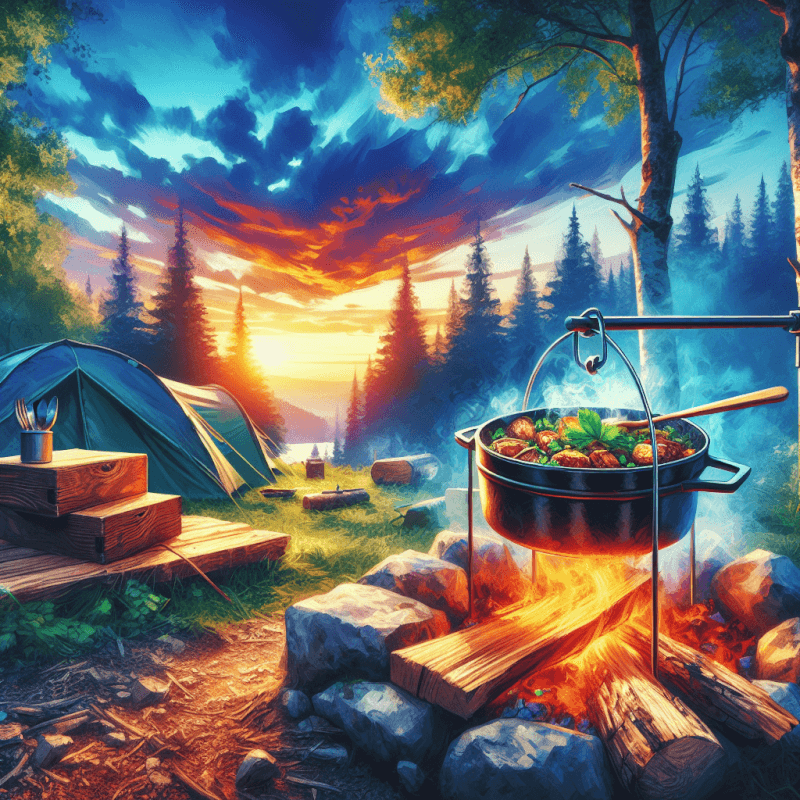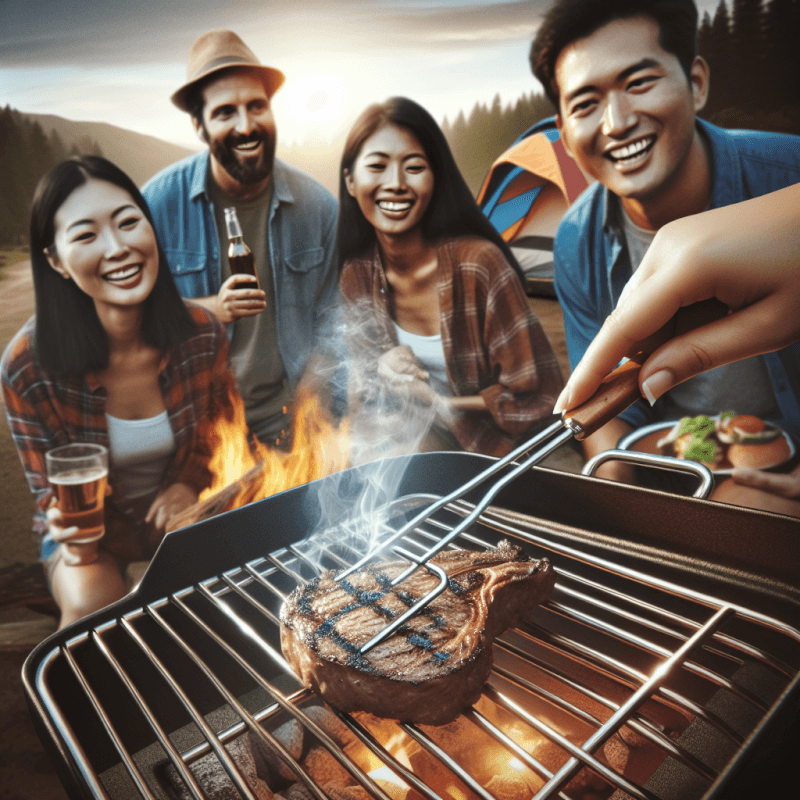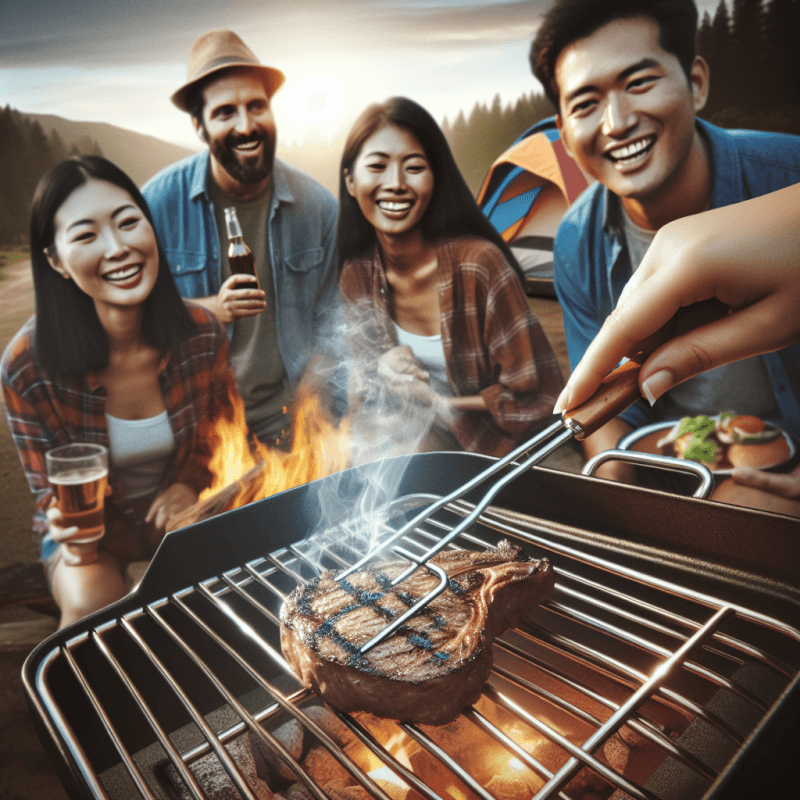Imagine sitting under a starlit sky, surrounded by friends and family, the tantalizing aroma of grilled burgers and roasted marshmallows wafting through the air. Ah, the joys of camping! But before you embark on your outdoor culinary adventure, you may wonder if it’s permissible to use a BBQ grill or campfire for cooking at campgrounds. Fear not, for this article will provide you with all the information you need to cook up a storm while enjoying the great outdoors. From campfire regulations to grill safety tips, we’ve got you covered. So grab your apron, gather your ingredients, and let’s sizzle our way to delicious meals amidst nature’s embrace.

Regulations and restrictions for outdoor cooking at campgrounds
Reviewing campground rules and regulations
Before planning your outdoor cooking adventure at a campground, it is essential to familiarize yourself with the rules and regulations in place. Each campground may have different restrictions regarding outdoor cooking, so it is crucial to review these guidelines to ensure a safe and enjoyable experience. These rules often outline specific areas designated for cooking, as well as any limitations on the type of equipment allowed.
Understanding fire restrictions and bans
In some cases, campgrounds may impose fire restrictions or even implement temporary bans on open flames. These restrictions are typically in response to environmental conditions like drought or high fire risk. It is vital to stay informed about current fire restrictions in the area you plan to visit to avoid any legal issues or potential danger. Campground websites and park rangers are excellent resources for obtaining up-to-date information regarding fire restrictions.
Checking for designated cooking areas
Many campgrounds provide designated cooking areas equipped with BBQ grills or campfire pits. These areas are specifically designed for outdoor cooking and offer a safe and controlled environment. When planning your trip, be sure to inquire about the availability and location of these designated cooking areas. Utilizing these spaces not only ensures compliance with campground regulations but also minimizes the environmental impact of your cooking activities.
Obtaining necessary permits
In certain cases, campgrounds may require permits for outdoor cooking activities, especially if you plan to use a campfire. These permits help regulate the number of campers using open flames and ensure that safety precautions are followed. It is essential to inquire about any necessary permits before your trip and obtain them as required. Compliance with these regulations demonstrates your commitment to responsible outdoor cooking and helps preserve the natural beauty of the campground.
Using a BBQ grill at campgrounds
Types of BBQ grills suitable for campgrounds
When it comes to using a BBQ grill at campgrounds, several options are available to suit your needs. Portable propane gas grills are often a popular choice due to their convenience and ease of use. These grills offer quick and efficient cooking without the need for charcoal or extensive fire-building. Additionally, compact charcoal grills can provide a traditional and flavorful cooking experience, perfect for those who prefer the smoky taste of charcoal-grilled food.
Safety precautions when using BBQ grills
While BBQ grills are relatively safe to use, it is crucial to take certain precautions to prevent accidents or injuries. Begin by choosing a stable and level surface for your grill, away from any flammable materials. Always keep a close eye on your grill while cooking and never leave it unattended. It is also important to ensure proper ventilation to prevent the buildup of carbon monoxide and always follow the manufacturer’s instructions for safe operation.
Properly maintaining and cleaning BBQ grills
To ensure the longevity of your BBQ grill and maintain its performance, regular maintenance and cleaning are essential. After each use, allow the grill to cool down before removing any remaining food debris. Brushing the grates with a grill brush and wiping down the exterior with a damp cloth will help keep your grill in optimal condition. Periodic deep cleaning, including removing and cleaning the burners, can help prevent grease buildup and ensure even heat distribution.
Tips for cooking on a BBQ grill at campgrounds
Cooking on a BBQ grill at a campground provides a unique opportunity to savor delicious outdoor meals. To make the most of your experience, consider the following tips:
- Plan your meals in advance: Make a list of ingredients and necessary cooking tools to ensure you have everything you need for your outdoor cooking adventure.
- Preheat your grill: Give your grill enough time to reach the desired cooking temperature. This will help ensure even cooking and prevent food from sticking to the grates.
- Use a meat thermometer: To ensure food safety and avoid undercooking, invest in a reliable meat thermometer to accurately monitor the internal temperature of your grilled meats.
- Experiment with marinades and rubs: Enhance the flavors of your grilled food by experimenting with different marinades, rubs, and seasonings. This will add depth and variety to your meals.
- Allow for resting time: Once your food is cooked, allow it to rest for a few minutes before serving. This allows the juices to redistribute, resulting in moist and tender meat.
Using a campfire for outdoor cooking at campgrounds
Campfire regulations and guidelines
Cooking over a campfire can provide a rustic and nostalgic experience at campgrounds. However, it is essential to be aware of the regulations and guidelines specific to campfire usage. Some campgrounds may have restrictions on the size of the fire or require a permit for campfire cooking. Familiarize yourself with these regulations to ensure compliance and prevent any potential hazards.
Selecting a safe and suitable campfire location
Choosing the right location for your campfire is crucial for both safety and environmental conservation. Look for designated fire rings or pits, as these areas are specifically designed to contain the fire and minimize the risk of spreading. If such designated areas are not available, ensure that you set up your campfire at least 15 feet away from any flammable material such as tents, trees, or shrubs.
Building and starting a campfire for cooking
Building a campfire for cooking requires proper technique and attention to safety. Follow these steps to build a campfire suitable for outdoor cooking:
- Clear the area: Remove any leaves, grass, or debris from the area where you plan to build your campfire.
- Create a fire ring: Arrange rocks or use a fire ring if available to contain the fire.
- Gather firewood: Collect dry firewood from the area around your campground. Use dead branches and fallen logs rather than cutting live trees.
- Build a fire structure: Start with a base of small and dry twigs arranged in a teepee or log cabin structure. Gradually add larger pieces of firewood as the fire grows.
- Start the fire: Use matches or a lighter to ignite the kindling at the base of the structure. Once the fire is established, add additional firewood as needed for cooking.
Cooking methods for campfire cooking
Campfire cooking offers a range of cooking methods that can add excitement and flavor to your meals. Consider these cooking methods for a memorable outdoor cooking experience:
- Skewer cooking: Skewering food items onto metal or wooden skewers allows for easy grilling over the open flame. This method works well for kebabs, vegetables, and even desserts like roasted marshmallows.
- Dutch oven cooking: Utilize a cast-iron Dutch oven to cook stews, soups, or even slow-cooked meats. The even heat distribution of a Dutch oven allows for delicious and hearty meals.
- Campfire grill grate: If your campground provides grill grates that can be placed over the fire, take advantage of this option for traditional grilling. Cook marinated meats, vegetables, and even fish directly on the grate for a smoky and flavorful meal.
Benefits of using BBQ grills or campfires for outdoor cooking
Enhancing the camping experience
Using BBQ grills or campfires for outdoor cooking adds a unique element to the camping experience. Whether it’s the sizzling sound of meat on a grill or the crackling of a campfire, these cooking methods bring a sense of coziness and enjoyment to the campground. Gathering around the grill or campfire with family and friends can create lasting memories and foster a sense of togetherness in the great outdoors.
Enjoying the flavors of outdoor cooking
There is an undeniable flavor and smokiness that outdoor cooking imparts on food. Whether it’s the sear marks from a BBQ grill or the aromatic wood smoke from a campfire, these distinctive flavors add depth and character to your meals. Outdoor cooking allows for a unique culinary experience that cannot be replicated in a traditional kitchen setting, making it an enjoyable and delicious way to dine at the campground.
Creating memorable moments with family and friends
Outdoor cooking creates opportunities for connection and bonding with loved ones. Whether you are cooking together, sharing stories around the campfire, or simply enjoying a meal together, these shared moments can become cherished memories. The simplicity and authenticity of outdoor cooking create an environment conducive to quality time and meaningful interactions, strengthening relationships and creating lifelong connections.

Precautions and safety measures when cooking outdoors
Keeping a safe distance from flammable materials
When cooking outdoors, it is crucial to maintain a safe distance from flammable materials. Whether you are using a BBQ grill or a campfire, ensure that there are no overhanging branches, tents, or other flammable objects in close proximity. By being mindful of your surroundings, you can minimize the risk of accidental fires and ensure the safety of yourself and others.
Avoiding grease fires and flare-ups
One of the most common hazards associated with outdoor cooking is the potential for grease fires and flare-ups. To prevent these dangerous situations, be mindful of the fats and oils used during cooking. Avoid excessive drippings by properly trimming excess fat from meats, and consider using a drip pan or aluminum foil to catch any runoff. Regularly cleaning grill grates can also help prevent the buildup of grease, reducing the risk of flare-ups.
Properly extinguishing fires and disposing of hot coals
Before leaving a campsite or ending your outdoor cooking session, it is vital to properly extinguish fires and dispose of hot coals. Extinguish campfires by pouring water over the flames and stirring the ashes until they are cool to the touch. Ensure that all embers and coals are completely extinguished before disposing of them in designated fire pits or metal containers. Properly handling and disposing of hot coals and ashes not only prevent fires but also preserve the campground’s natural environment.
Using appropriate cooking utensils and tools
Using the correct cooking utensils and tools is essential for both safety and cooking success. Invest in long-handled utensils to prevent burns and protect yourself from the heat of the grill or campfire. Tongs, spatulas, and grill brushes specifically designed for outdoor cooking provide better control and durability. Additionally, heat-resistant gloves can offer added protection when handling hot surfaces or open flames.
Alternative cooking methods at campgrounds
Using portable stoves and cookers
In addition to BBQ grills and campfires, portable stoves and cookers offer a convenient and versatile cooking alternative at campgrounds. These compact and lightweight devices are fueled by propane or butane and provide a controlled and efficient cooking experience. Portable stoves often come with multiple burners for simultaneous cooking, allowing you to prepare a variety of dishes. They are particularly useful in areas where campfires or BBQ grills are restricted or not available.
Exploring solar-powered cooking options
For eco-conscious campers, solar-powered cooking options provide a sustainable and innovative approach to outdoor cooking. Solar cookers harness the power of the sun to heat and cook food. This method eliminates the need for traditional fuel sources, making it a clean and renewable alternative. Solar cookers are particularly useful in areas with ample sunlight and are an excellent option for those looking to minimize their environmental footprint.
Considering pre-cooked or ready-to-eat meals
For campers looking for a hassle-free and convenient cooking experience, pre-cooked or ready-to-eat meals can be a practical solution. Pre-packaged camping meals are available in various flavors and cuisines and only require simple heating or boiling. These meals are lightweight, compact, and easy to store, making them an excellent option for backpackers or campers with limited cooking facilities. While not as traditional as cooking over a fire, pre-cooked meals provide a quick and satisfying camping dining experience.

Respecting the environment and wildlife
Minimizing the impact of cooking activities
As outdoor enthusiasts, it is our responsibility to minimize the impact of our cooking activities on the natural environment. When setting up your cooking area, be mindful of fragile vegetation and the potential damage caused by heat or flames. Avoid using non-biodegradable materials for food storage and opt for reusable containers whenever possible. By practicing Leave No Trace principles, we can help preserve the beauty and integrity of our campgrounds for future generations.
Properly disposing of food waste
Proper disposal of food waste is essential to prevent attracting unwanted wildlife and to maintain a clean and healthy camping environment. Avoid leaving food scraps outdoors, as this can create an enticing environment for animals. Instead, securely store food waste and dispose of it in designated trash receptacles. By taking these measures, we can minimize the potential harm caused by interacting with wildlife and promote harmonious coexistence.
Adhering to wildlife safety guidelines
When camping and cooking outdoors, it is important to be mindful of wildlife and respect their habitat. Keep food stored securely to prevent animals from being tempted by the smell. Avoid feeding wild animals, as it can disrupt their natural behaviors and pose risks to their health and safety. Familiarize yourself with wildlife safety guidelines specific to the area you are visiting and follow them diligently to ensure a safe and enjoyable camping experience.
Preventing wildlife attraction with food
To minimize the risk of attracting wildlife to your campsite, take precautions to store and handle food properly. Use sealed containers or bear-resistant canisters to store food, and keep them in a secure location, away from sleeping areas. Store trash in animal-resistant containers or follow campground guidelines for proper disposal. By removing potential food sources, you can reduce the likelihood of unwanted wildlife encounters and maintain a safe camping environment.
Tips for a successful outdoor cooking experience at campgrounds
Planning meals and bringing necessary supplies
A successful outdoor cooking experience begins with careful meal planning and preparation. Create a detailed menu and make a list of all the ingredients and necessary cooking tools you will need. Consider the cooking equipment available at your chosen campground and plan meals accordingly. Preparing the majority of your meals in advance can help streamline the cooking process, allowing you to spend more time enjoying the campground.
Considering dietary restrictions and food allergies
When planning meals for your outdoor cooking adventure, it is essential to consider any dietary restrictions or food allergies of your group members. Be mindful of any specific dietary needs and ensure that there are suitable options available for everyone. It may be necessary to pack alternative ingredients or seek out specialized food products to accommodate these dietary requirements. By doing so, you can ensure that everyone can fully enjoy the outdoor culinary experience.
Trying new recipes and techniques
Outdoor cooking at campgrounds provides an excellent opportunity to explore new recipes and cooking techniques. Step out of your cooking comfort zone and experiment with different flavors, cuisines, and methods of cooking. Whether it’s trying your hand at Dutch oven baking or grilling unfamiliar vegetables, embracing culinary creativity can make your campground meals even more exciting and enjoyable.
Engaging in campfire cooking traditions
Many campgrounds have long-standing traditions and practices when it comes to campfire cooking. Embrace these traditions and engage in the activities that have been cherished by generations of campers. Whether it’s participating in a group cookout, sharing campfire stories, or swapping recipes with fellow campers, these traditions foster a sense of community and add a unique dimension to your outdoor cooking experience.

Educational resources for outdoor cooking at campgrounds
Campground and park websites
Campground and park websites are excellent resources for obtaining information specific to the cooking regulations and facilities available. These websites often provide detailed guides and maps of designated cooking areas, as well as important updates on fire restrictions and permits. Take advantage of these online resources to ensure you are well-prepared and informed before embarking on your outdoor cooking adventure.
Cookbooks and outdoor cooking guides
There are countless cookbooks and outdoor cooking guides available that cater specifically to cooking at campgrounds. These resources offer a wealth of recipes, tips, and techniques tailored to the unique challenges and opportunities of outdoor cooking. From simple and quick meals to gourmet dishes, these cookbooks provide inspiration for diverse and delicious campground cuisine.
Online communities and forums
Joining online communities and forums focused on outdoor cooking can provide a wealth of information and advice from experienced campers and outdoor enthusiasts. These platforms allow you to connect with like-minded individuals, share personal experiences, and learn from others’ successes and challenges. Engaging with these communities can enhance your outdoor cooking skills and provide valuable insights for a successful campground culinary adventure.
Local workshops and classes
If you prefer a more hands-on approach to learning outdoor cooking techniques, consider attending local workshops or classes. Many outdoor recreation organizations and culinary schools offer workshops that cover various aspects of outdoor cooking, from campfire cooking to gourmet meals on BBQ grills. These workshops provide opportunities to hone your skills, ask questions, and interact with experts in the field. Check with local community centers, outdoor stores, or cooking schools to find in-person learning opportunities near you.
Conclusion
Outdoor cooking at campgrounds offers a rewarding and enjoyable experience for campers of all ages. By familiarizing yourself with the regulations and restrictions in place, utilizing proper equipment, and following safety precautions, you can ensure a safe and memorable outdoor cooking adventure. Whether you choose to use a BBQ grill, cook over a campfire, or explore alternative cooking methods, embracing the joys and traditions of outdoor cooking will enhance your camping experience and create lasting memories with family and friends.



